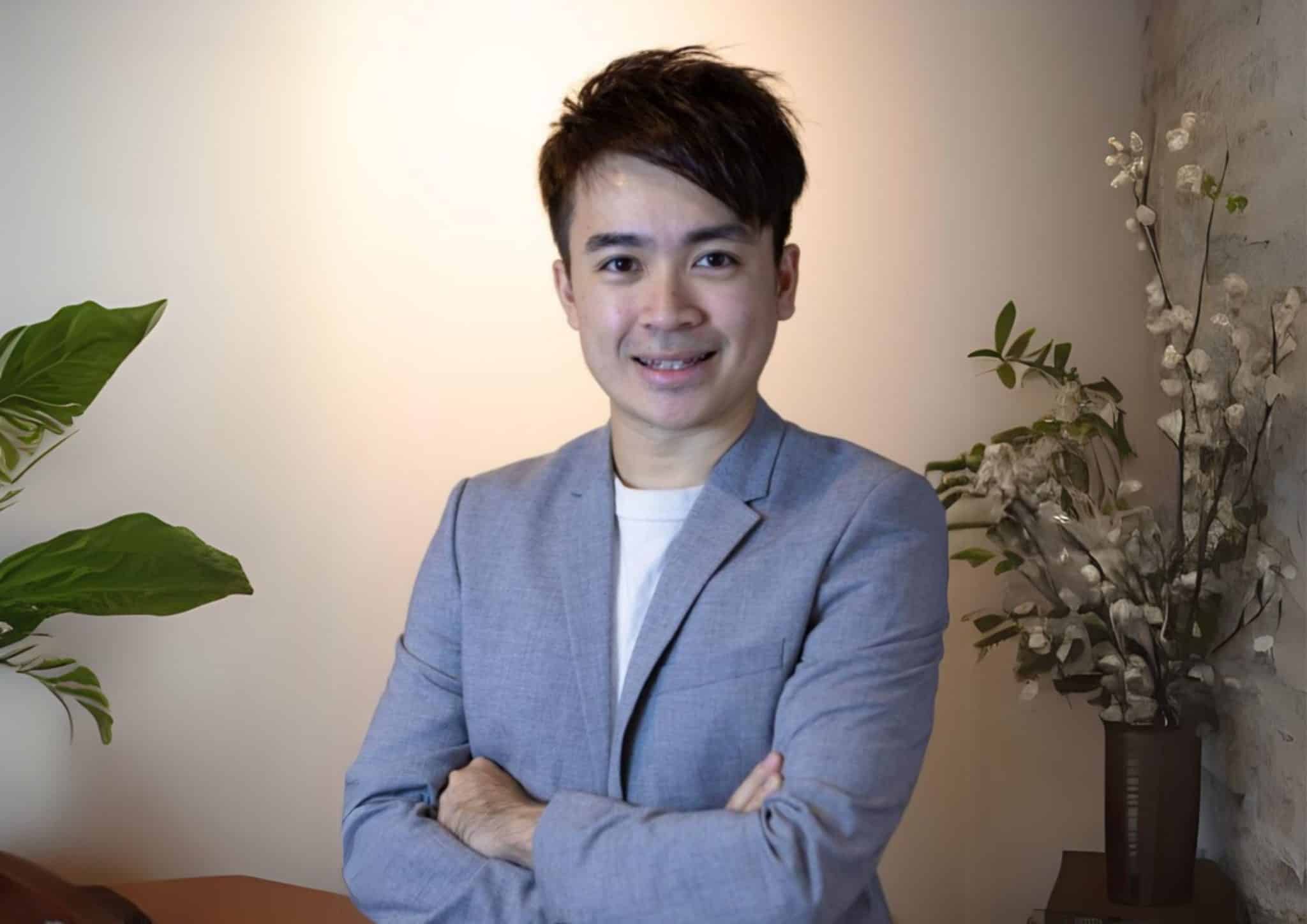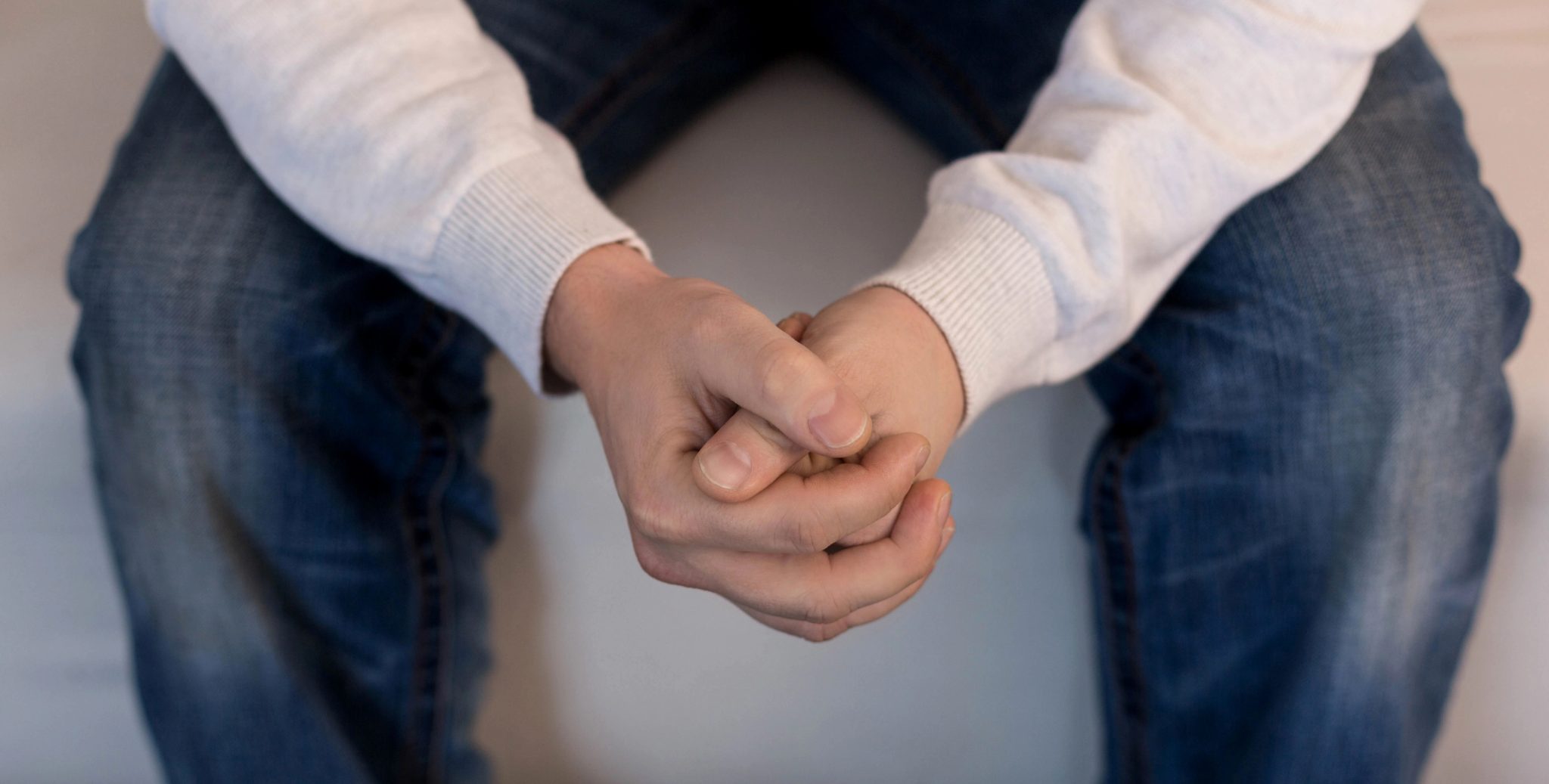A father, a church leader and a businesswoman share how God picked them up after painful mistakes
Salt&Light // December 31, 2019, 6:00 am
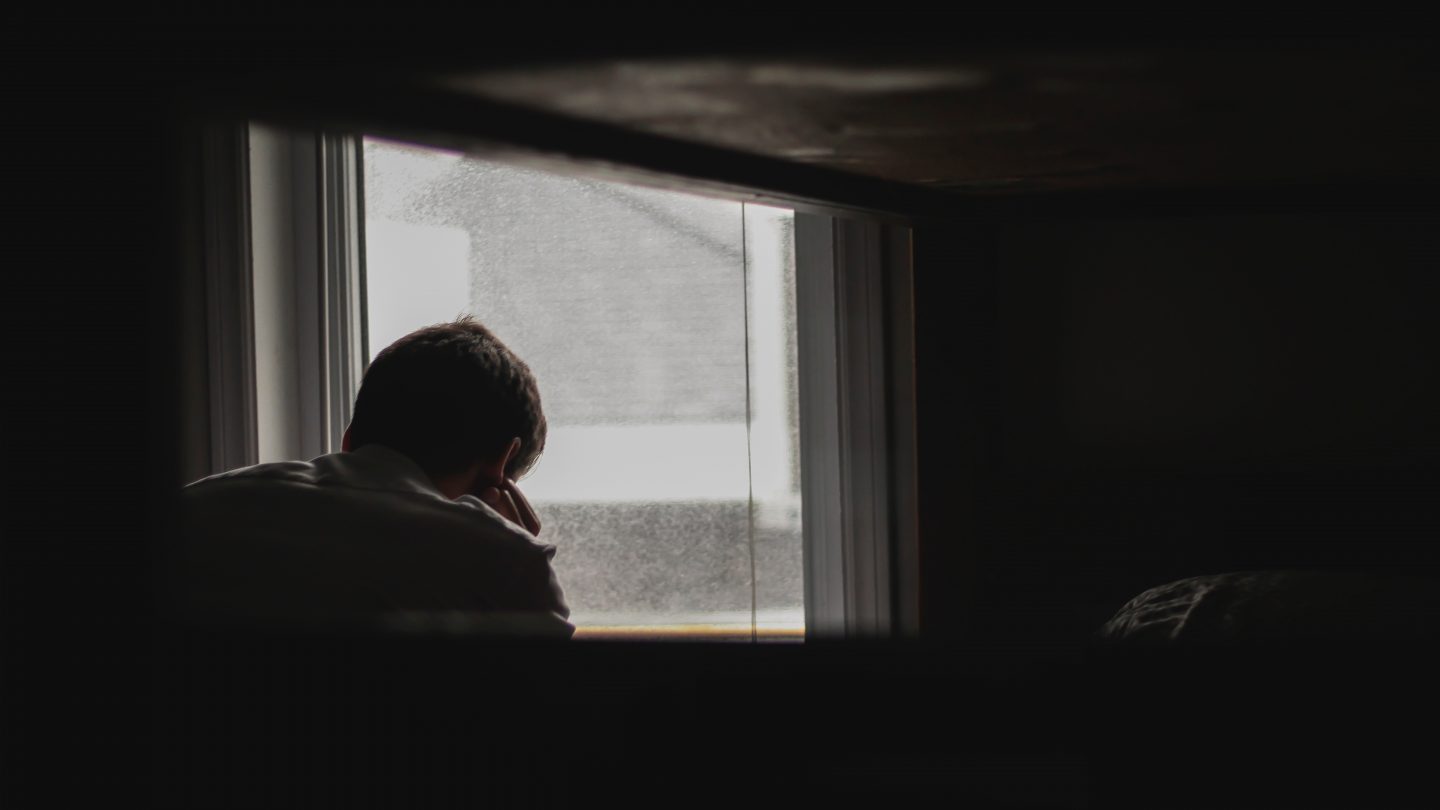
Twenty-four hours was all it took for Rev Timothy Khoo's life to come crashing down. But “the exposure of my sin saved me from the duplicitous self that I had become”, he revealed. Photo by Andrik Langfield on Unsplash.
All of us are well-acquainted with failure. From the average man on the street to high-ranking church ministers, not one of us is spared the brokenness of our souls and this world.
Yet, in God’s unfailing goodness, He transforms our failures into tools that chisel us into the image of His Son, drawing us closer to Him in the process.
Three believers – a father/husband, a pastor/church leader, and a businesswoman – who encountered painful failure as well as Grace and new hope in spite of their mistakes, share the lessons they learnt :
“There is no ‘lost cause’ when it comes to God”: Father/husband Lim Yoon Pin

Lim Yoon Pin (second from right) and his family during a holiday to Shanghai, China. Photo courtesy of Lim Yoon Pin.
Father-of-four Lim Yoon Pin readily admits that he was a failure as a husband and father in his earlier years.
“My sole ambition was to establish my career,” said Lim, an assistant professor at the National University of Singapore, where he specialises in cancer research.
“I had just received my doctoral degree and was so focused on work that I spent little time communicating with my wife and connecting with my children. It was irresponsible but it didn’t bother me back then. To be honest, I only loved myself.
“Over the years, my relationship with my children also deteriorated as I morphed into an authoritarian figure who imposed hard-to-reach standards and was critical whenever they fell short of my expectations.
“My quick temper created an atmosphere of fear and tension — it was a toxic environment for everyone.”
Deeply hurt by his attitude and lack of involvement in family life, Lim’s wife called for a separation. This forced him to confront the consequences of his actions.
“Being aware of my own weaknesses has helped me to be intentional in my actions which, over time, has created healthy habits.”
Not long after, at a Father’s Day movie screening at a church, Lim was convicted of his failings and resolved to change.
“Once I acknowledged my shortcomings as a husband and father, God began His restoration work in me. I renewed my relationship with my Abba Father, and my own fathering perspectives soon began to transform.
“There is no ‘lost cause’ when it comes to God,” he said. “As I took small steps to reclaim stewardship over my family and children and to prioritise their emotional well-being, I began to see a change in our relationships.
“Transformation takes effort and time. Altering my fathering style is a gradual and challenging process. However, being aware of my own weaknesses has helped me to be intentional in my actions which, over time, has created healthy habits.
“My wife now has a husband who cares for his family with the love of our Heavenly Father, and my children have a father who has changed from an authoritarian figure into a loving and accepting parent.”
“The most dreadful, painful day of my life was a day of grace”: Reverend Timothy Khoo
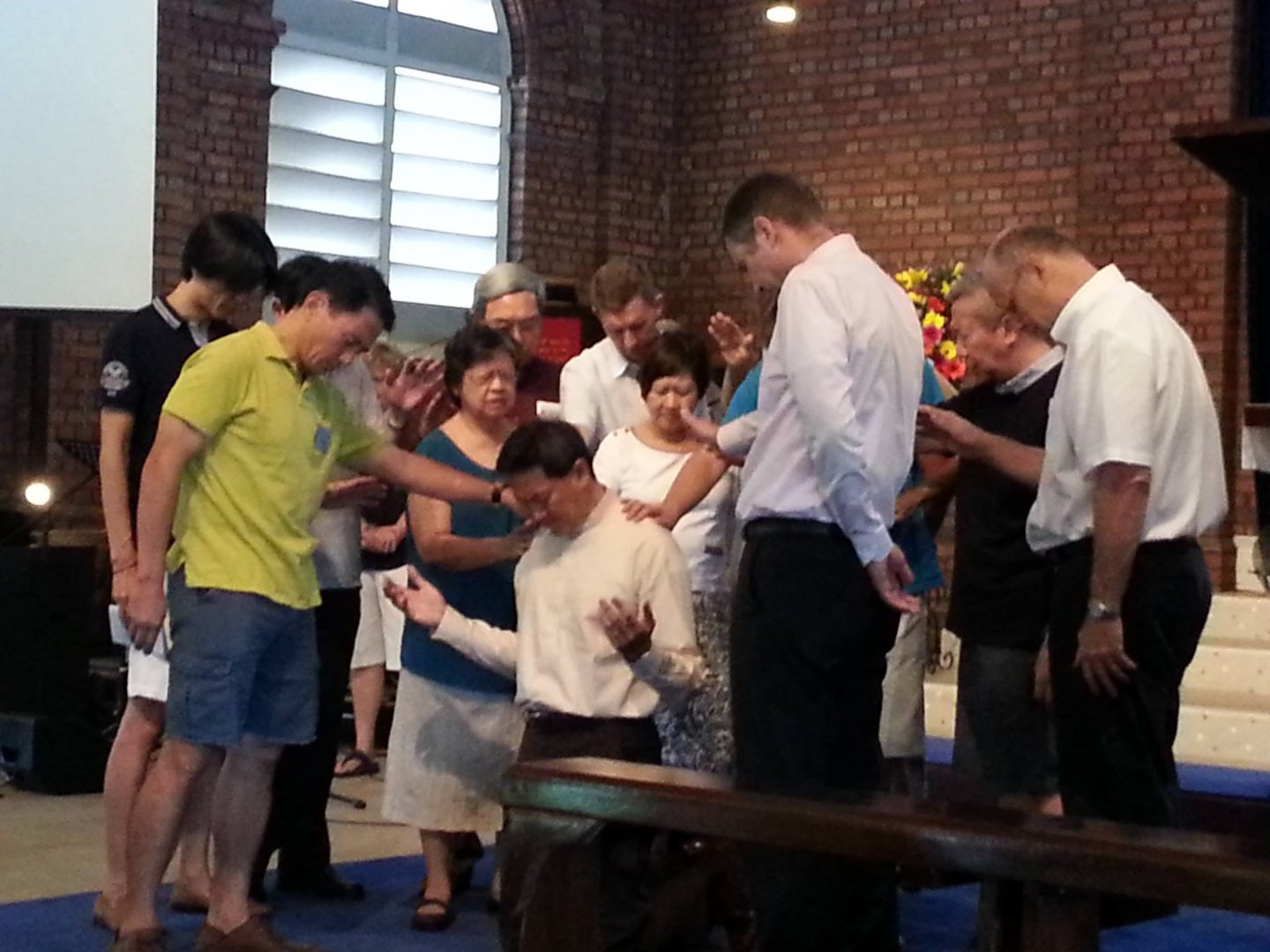
Rev Khoo, receiving prayer in his former home parish ahead of his installation as Prison Fellowship International’s president and CEO in July 2013. Photo from Prison Fellowship International’s Facebook page.
Five years ago on August 30, 2014, Reverend Timothy Khoo, then a prominent preacher in one of the main denominations and the former president and CEO of Prison Fellowship International, was found to have been involved in an inappropriate relationship.
It tore apart his marriage and family. He was asked to step down from his position in church for a year, as part of church discipline.
It has been a tough journey, but as Rev Khoo looks back, he sees nothing but the grace of God — a grace that convicted him of his prideful heart and a God who loved him in spite of that.
Yet there was a notion he struggled with: “Whenever someone falls from some lofty position, whether in the secular world or in Christian organisations, we talk about a fall from grace.”
He broached the topic with Friar John Wong from Order of Friars Minor, who provided him spiritual direction during that year of church discipline.
“Help me understand this. I cannot wrap my mind around how I fell from grace. Because as I understand grace, I can’t fall from it. Because grace is unmerited. So, what have I fallen from?” (Ephesians 2:8) asked Rev Khoo.
“We have inexplicably fallen not from grace, but we have undeservedly fallen into grace,”
“Shouldn’t we give thanks for our human nature, as broken as it is? Because we have inexplicably fallen not from grace, but we have undeservedly fallen into grace,” replied Friar John.
Rev Khoo conceded: “August 30, 2014, was the most dreadful, painful day of my life. But it was a day of grace.”
He remembered being ministered by Brennan Manning’s memoir, All Is Grace:
Do you believe that the God of Jesus loves you beyond worthiness or unworthiness, beyond fidelity or infidelity – that He loves you in the morning sun and the evening rain – that He loves you when your intellect denies it, your emotions refuse it, your whole being rejects it. Do you believe that God loves without condition or reservation and loves you this moment as you are and not as you should be?
Rev Khoo said: “He wants us to be the best, but He doesn’t love us so that we can become the best. He loves us as we are, not as we should be. That is God, the unconditionality of God’s love.
“And He knows that the freedom from sin allows us to be the best that we can become. But He doesn’t love us because of that. He loves us in spite of that, He loves us as we are.
“The message going out was the realisation of the weight of my sin. The revelation coming back is that all is grace. And so August 30, 2014, became for me, a day of grace.”
“Everything that happens in our life is for a purpose”: Ex-offender Letticia Chan
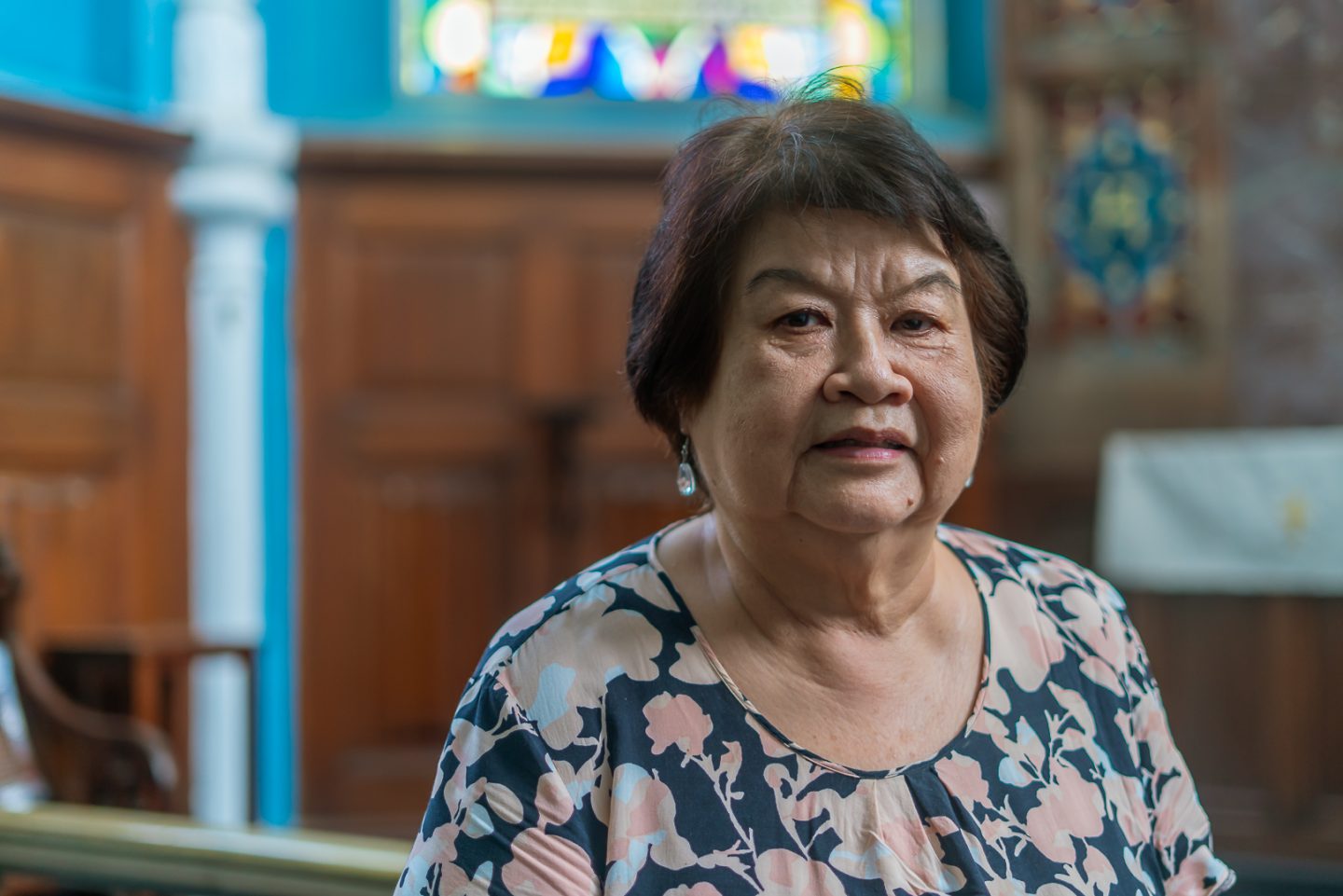
“When I was in prison, I was so close to Him. And I’m not going to let that go,” said Letticia Chan. Photo by Rachel Phua.
In 2001, Letticia Chan was running a catering business when she was convicted for employment of an illegal worker and sentenced to one year in Changi Prison.
A mortified Chan recalled her Christian lawyer telling her before she went in: “God doesn’t put you anywhere without a reason.” He proved to be right.
In prison, some fellow convicts warmed up to her enough for her to share the Gospel with them.
An inmate jailed for drug trafficking asked her: “Can you help me with the Bible?”
Chan agreed and they began reading the Bible together.
Out of boredom, other inmates who saw Chan reading her Bible asked to borrow it. She would share the Gospel and offer to pray for them.
She eventually began a cell group. “We always laughed about it because our cell group was literally in a cell!” she chuckled.
When she was released, she decided to serve full-time in St Andrews Cathedral’s prison ministry.
She conducted chapel every Saturday with the inmates. She also counselled them one-on-one, helping them to reintegrate into society.
“I actually thank Him now … my life has become a much better life to live.”
God birthed in her a desire to share His love and grace just as she had received it (1 Peter 4:8).
“When I got into all this (trouble), I didn’t understand why. But when I went back to teach in prisons, then I realised: Because of my own experience, I could understand the people I was talking to.
“The best part is that when I teach, they accept me because I am one of them.”
When she was convicted, she was angry with God. Eventually, however, she saw how her lawyer’s words echoed Romans 8:28: “And we know that for those who love God, all things work together for good, for those who are called according to his purpose.”
She said: “I really believe that everything that happens in our life is for a purpose, but you must use it for God’s purpose.
“When I look back, this sort of thing can only happen because there was a higher power that made it happen. So although I should be ashamed of going to prison, I’m not. It changed me.
“Where would I be if I didn’t go to prison? I might still be earning, cooking and maybe killing myself, doing everything silly, forgetting about my salvation.
“I actually thank Him now … my life has become a much better life to live.”
We are an independent, non-profit organisation that relies on the generosity of our readers, such as yourself, to continue serving the kingdom. Every dollar donated goes directly back into our editorial coverage.
Would you consider partnering with us in our kingdom work by supporting us financially, either as a one-off donation, or a recurring pledge?
Support Salt&Light